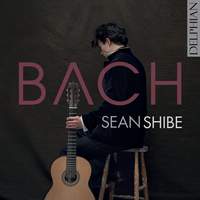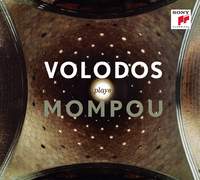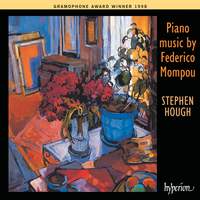Interview,
Sean Shibe on Camino
 It was around this time last year that the Scottish guitarist Sean Shibe told me that he was planning to make his debut on Pentatone with a programme of Spanish repertoire, inspired in part by the comfort and joy which he'd been finding in playing the music of Federico Mompou purely for his own pleasure during the long performance-free months of lockdown. It was a tonic to catch up with this ever-entertaining and inspiring artist over Zoom last week to find out more about a project which he describes as 'a profound spiritual journey', the musical and interpersonal connections between several of the composers which feature on his astutely-chosen programme, and the impact of his switch to both a new instrument and a new record-label...
It was around this time last year that the Scottish guitarist Sean Shibe told me that he was planning to make his debut on Pentatone with a programme of Spanish repertoire, inspired in part by the comfort and joy which he'd been finding in playing the music of Federico Mompou purely for his own pleasure during the long performance-free months of lockdown. It was a tonic to catch up with this ever-entertaining and inspiring artist over Zoom last week to find out more about a project which he describes as 'a profound spiritual journey', the musical and interpersonal connections between several of the composers which feature on his astutely-chosen programme, and the impact of his switch to both a new instrument and a new record-label...
When we spoke about your recording of Bach Lute Suites last summer, you mentioned that you were keen on the idea of putting a Spanish album together if you could find a way to circumvent some of the clichés associated with that kind of project…how did that play out in your programming-choices for Camino?
There’s the classic danger of the guitar being typecast as the instrument that’s associated with Spanish flamboyance, and to what degree that preconception can distract from what’s really going on in this music. But I do think that potential pitfall is more of an issue within advertising and press-coverage than it is for the person who’s actually programming and performing it: it could very easily be portrayed as repertoire that the guitar deals with a lot, but in a sense it’s anything but! It is on its surface Spanish, but just slightly below that surface it’s very French and indeed very European, which is a relationship that I’ve tried to point out - perhaps a little bluntly!
What sort of biographical and artistic connections did you unearth between the French and Spanish composers featured on the album?
I think there are some quite obvious things which testify to the ubiquity of Spanish dance-forms throughout Europe over the course of the last 500 years. You have Poulenc writing a Sarabande, and there are references to Spanish influence throughout Europe and vice versa in the latter part of Mompou’s Suite Compostelana; the Muneira references the Galician bagpipes very heavily, so there’s a nice reference to the Celtic diaspora as well.
But Satie and Mompou are ideal composers to place alongside one another for less obvious reasons, because they portray very different versions of the same thing - namely a sort of childlike attitude. Stephen Hough writes really well about this in the liner-notes for his Hyperion album of Mompou piano music: ‘In spite of Mompou’s enormous debt to Satie in so many formal and musical ways, however, the two composers are poles apart in their personalities and spiritual vision. Where Satie used naivety or childishness to mock the pretentions and pomposity of adulthood, Mompou rather took the insights of maturity to rediscover the magic of childhood. Satie’s smile has a knowing look, his eyes narrowing into cynicism; Mompou’s eyes are wide open, sparkling like a child’s’.
I think this idea of Satie’s cynicism and Mompou’s wonder – wonder being the genesis of all knowledge – makes for such a strong and fascinating relationship. And even leaving aside the philosophical disparity between the two composers, they’re two very different miniaturists aesthetically. (Stephen’s Mompou recording was one source of inspiration for me here, as was the incredible Arcadi Volodos and his gigantic Sony series).
There are a couple of other interesting relationships between composers on the album; for instance the liner-notes mention Ravel’s assertion that Antonio José ‘will be the Spanish composer of our century’. But José was shot dead tragically at the age of 33, and when you look into the stories behind his death you see that it was basically nothing short of a local macabre village conspiracy that led to his execution. There are various supportive letters which were sent to him by Falla during this period, and Lorca essentially tried to have him set free before he himself was also executed.
And then, of course, de Falla’s relationship with French impressionism, Mompou’s quotation of older forms of choral music in Cancion y Danza X echoed in his contemporary Coral, and Ravel’s tragic sad innocence.
Were you tempted to include the complete José sonata?
Out of vanity alone I do have really big issues with that sonata – I just don’t think it holds up structurally. I spent a lot of my teenage years thinking ‘This is a masterpiece’, but the more time I spent with it the less convinced I was! I think the best movement is the Pavana Triste, and that’s also the movement which best emphasises that French connection which I wanted to explore on the album. The José is also slightly more rigorously Spanish than the other works, so I thought that including it as well as the de Falla would make the programme too heavily weighted in that direction.
Was Mompou a composer you discovered during lockdown, or was it a case of revisiting his music with fresh eyes over the past difficult sixteen months?
It was a combination of the two, really. I’ve been playing Mompou since I was maybe 19 or 20 and it was music that I explored when I was part of the BBC New Generation Artists scheme; I was playing quite a bit of other Spanish music alongside it, and I knew immediately which I preferred! The original plan was that my debut recording on Pentatone would be a concerto release; we were going to dive straight into something extremely out-there which would have been super-cool, but COVID meant that the Proms were cancelled so those pieces haven’t yet made it off the ground.
We had to very quickly rethink how we wanted to approach the first album together, and over that period of the first lockdown and all the attendant cancellations I had some time to just play some simpler music that I really enjoyed – Mompou’s simplicity in the Mozartian sense, obviously - and the genesis of this project was to present some of the music that just gave me a lot of comfort during that very discomforting time. The eventual title Camino was ideal – it means ‘the path’, the resolution, and that radically humanist vision of a profound spiritual journey was very fitting for where this album came from.
Was Mompou a guitarist himself?
No, and he didn’t actually write that much for the guitar either. He composed this suite for Andrés Segovia, who altered some of it really quite heavily – what you hear on the album is a sort of composite of Segovia’s editions and more recent editions that have been found since Mompou’s death. But it doesn’t seem to have been an especially close or collaborative relationship: when you look at the letters between them, it’s just Segovia saying things like ‘Thank you for the score, which I’ve now edited and this is how I’m going to perform it’. There are whole lines which he removed, and vast swathes of the score which are crossed out completely.
It’s a shame that Mompou didn’t write more guitar music, and in a sense I think Segovia has a lot to answer for in that either through vanity or for aesthetic reasons he didn’t really plumb the depths of what the best composers who were writing for him could have achieved. And this wasn’t exactly one of the pieces he performed the most – he recorded it and made his own edition, but he wasn’t championing it to encourage Mompou to write more, which he did with other composers.
Mompou can sometimes be incredibly idiomatic in his writing for the guitar and at other moments it’s merely compressed piano music, which at its worst often leads to something quixotic but at its best reveals an approach to modernity that’s extremely seductive. I think he really can strip away to something very unique, as far removed from the technicolour wonder (harmonically speaking) of his solo piano pieces as you can imagine. It becomes instead something that embraces the origins of guitar music – modal but not particularly harmonically adventurous, a little bit more Arcadian.
And what about the other composers here who didn’t have first-hand knowledge of the guitar? Is that evident in their writing, or does the music sit under the hands fairly well?
Both the Poulenc and the de Falla are the only works which they wrote for the instrument, but they’re honestly perfect: I think Britten said that de Falla’s Homenaje a Debussy ‘is only several minutes long but there is twenty minutes of music in it’. And even with the Mompou, the challenges are only subtly discernible – nothing individually is difficult in terms of the textures, but it’s tricky in terms of the assumptions that he makes in terms of how sustainable certain approaches to position-shifting are over the course of a twenty-minute piece. It becomes exhausting in a very specific way, but it’s ultimately still disarming because of that aforementioned innocence.
Repertoire aside, this recording seems dramatically different from your last three albums in purely sonic terms – was that down to your instrumental set-up, or the switch to a new record-label?
Both! I’m playing a totally different instrument, which I got maybe a year before I made this recording. It’s also a much more modern set-up which favours a certain clarity at the expense of a range of colour, and that's a gamble I took because of the repertoire I was exploring at the time - I’m enjoying this current foray into contemporary guitar stuff, though I’m not sure how long I’ll stick with it! But Camino felt like a different way to explore that instrument; there has been a fair amount of healthy nihilism during the lockdowns that’s thrown up different approaches to working, and I’m glad that I accelerated that discovery-process.
The technical set-up was also very different from previous recordings – Pentatone like to use surround, which I think creates a very different bloom to what I’m used to. It’s a more mellow sound, which isn’t necessarily what I was expecting given the difference in quality between the two instruments I’ve recorded on. Dave Rowell (who I’d worked with previously) was the engineer, and I also brought over Matthew Swann who used to do a lot for Delphian and was the main producer of the Bach album.
The album includes your own arrangement of Ravel’s Pavane pour une Infante défunte - is transcription something you enjoy and plan to explore more in the future?
Oh yes, guitarists are generally used to doing their own transcriptions - we have to be! The Bach transcriptions were basically mine as well, despite what the metadata may say: digital service providers usually have to credit a single arranger, but for the most part I was using other people’s transcriptions as a basis for my own ideas. For this project I used Tilman Hoppstock for the de Falla, Gilardino among other sources for the José, and a combination of Reichenbach and Gilardino for the Mompou Cancions i danzas. But by the time you bring them to a recording they’re so different that I couldn’t authentically say that the final versions belonged to them or to me!
Sean Shibe (guitar)
Available Formats: CD, MP3, FLAC, Hi-Res FLAC, Hi-Res+ FLAC
Sean Shibe (guitar)
Available Formats: CD, MP3, FLAC, Hi-Res FLAC
Arcadi Volodos (piano)
Available Formats: MP3, FLAC, Hi-Res FLAC
Stephen Hough (piano)
Available Formats: CD, MP3, FLAC






